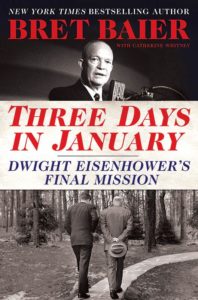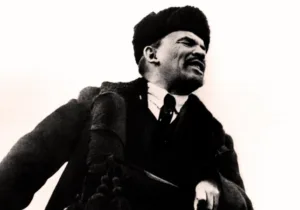Fox News anchor Bret Baier’s new book Three Days in January: Dwight Eisenhower’s Final Mission focuses on Ike’s famous 1961 farewell speech warning against the “military industrial complex.”
For over 50 years critics of military spending have cited Ike’s warning as validation. They often ignore the speech’s wider context and nuance. He had across eight years presided unapologetically over unprecedented peacetime military spending, which then was over half the federal budget and nearly one tenth of GNP, compared to 20% and 4% now, respectively.
 This exertion had gained eight years of peace, Ike having successfully ended Korean hostilities early in his presidency, amid remarkable prosperity. It also relied on a nearly hair-trigger policy of threatened nuclear “massive retaliation” against Soviet aggression. U.S. bombers were continuously on call to deliver atomic destruction to the Soviets, whose larger conventional forces could otherwise threaten occupation of Western Europe. This threat of nuclear retaliation depended on Eisenhower’s steely personal credibility. Would he wage nuclear war in defense of the West? For deterrence to work, the Soviets had to believe in at least the possibility he would.
This exertion had gained eight years of peace, Ike having successfully ended Korean hostilities early in his presidency, amid remarkable prosperity. It also relied on a nearly hair-trigger policy of threatened nuclear “massive retaliation” against Soviet aggression. U.S. bombers were continuously on call to deliver atomic destruction to the Soviets, whose larger conventional forces could otherwise threaten occupation of Western Europe. This threat of nuclear retaliation depended on Eisenhower’s steely personal credibility. Would he wage nuclear war in defense of the West? For deterrence to work, the Soviets had to believe in at least the possibility he would.
Outwardly placid, Ike masterfully played this game of sustained brinkmanship, but it must have exhausted him. He also was exasperated by his failure to parley America’s unmatched nuclear arsenal into a negotiated understanding with the Soviets that included mutual arms reductions. Initial rapport with Khrushchev, which included the Soviet chief’s ingratiating visit with Ike’s grandchildren at the presidential farm in Gettysburg, had exploded with the shooting down of a U-2 spy plane by the Soviets. Khrushchev’s histrionics at the Geneva summit enraged Ike, whose scheduled visit to the Soviet Union, with his grandchildren, naturally was cancelled.
Further infuriating Ike was JFK’s 1960 presidential campaign theme alleging American military deficiency compared to the Soviets, including a non-existent missile gap. JFK had pledged increased military spending with more assertive American policies against the Soviets and their proxies. Ike thought JFK disingenuous and unseasoned. His farewell speech mentioning the military industrial complex, just three days before JFK’s ambitious Cold War inauguration address, would effectively be Ike’s preemptive response.
Ike’s concerns about possibly unsustainable military spending and the accompanying political and economic pressures for expansive arms expenditures had predated his farewell by many years. At least a year before his retirement, he had planned to share his concern over the military industrial complex with the American people. George Washington’s farewell address was his model, and Ike’s goodbye is arguably the best recalled and most significant of any presidential valedictory since Washington’s. Largely overshadowed by JFK’s inauguration, Ike’s speech did not at the time receive deserved attention but has more than been compensated for the oversight in the subsequent 56 years.
Warning against the military industrial complex was part of Ike’s larger political architecture of equilibrium. As a soldier-statesman, he strove for moderation and national consensus, sustained by careful presidential statecraft that avoided soaring or polemical rhetoric. He sought an America without military equal, dominant in the world, but not hubristic or bellicose. Eisenhower was confident in the superiority of American democratic principles. But he was too sophisticated and worldly to believe in unlimited American virtue or capacities. He also had a deep if not always articulated Christian faith that protected him from excessive idealism and utopianism.
Reinhold Niebuhr, composer of Christian Realism, was a Democrat who did not vote for Ike. But Eisenhower arguably better embodied Niebuhr’s perspective on the duties and limits of American power than did Adlai Stevenson or JFK.
Ike and JFK did not like each other, but their first meeting after JFK’s election was friendly and chatty. Ike warned him against premature overtures to the Soviets, and his counsel about Fidel Castro was misconstrued by JFK, who sought his predecessor’s advice after the Bay of Pigs disaster. He also conferred with Ike during the far more dire Cuban missile crisis, with Ike correctly counseling that Khrushchev did not want a nuclear confrontation over Cuba.
Baier’s book neatly encapsulates these moments of high strategic drama, set against the backdrop of Ike’s shrewd Midwestern good sense and integrity. Here are the key words from Ike’s farewell address about the military industrial complex:
A vital element in keeping the peace is our military establishment. Our arms must be mighty, ready for instant action, so that no potential aggressor may be tempted to risk his own destruction. Our military organization today bears little relation to that known of any of my predecessors in peacetime, or, indeed, by the fighting men of World War II or Korea. Until the latest of our world conflicts, the United States had no armaments industry. American makers of plowshares could, with time and as required, make swords as well. But we can no longer risk emergency improvisation of national defense. We have been compelled to create a permanent armaments industry of vast proportions. Added to this, three and a half million men and women are directly engaged in the defense establishment. We annually spend on military security alone more than the net income of all United States corporations. Now this conjunction of an immense military establishment and a large arms industry is new in the American experience. The total influence—economic, political, even spiritual—is felt in every city, every Statehouse, every office of the Federal government. We recognize the imperative need for this development. Yet, we must not fail to comprehend its grave implications. Our toil, resources, and livelihood are all involved. So is the very structure of our society. In the councils of government, we must guard against the acquisition of unwarranted influence, whether sought or unsought, by the military-industrial complex. The potential for the disastrous rise of misplaced power exists and will persist. We must never let the weight of this combination endanger our liberties or democratic processes. We should take nothing for granted. Only an alert and knowledgeable citizenry can compel the proper meshing of the huge industrial and military machinery of defense with our peaceful methods and goals, so that security and liberty may prosper together.







 Sponsor a student for Christianity & National Security 2024
Sponsor a student for Christianity & National Security 2024